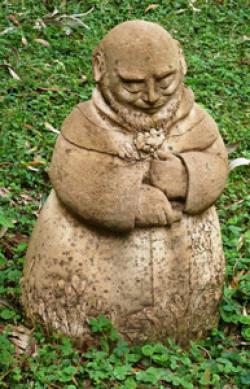Fr Charles Rue wrote "St Francis reaching out" as part of three articles on Eco-Spirituality and St Francis of Assisi
 St Francis harnessed traits in his personality to serve his preaching. Daring to be different as a young troubadour and having a spirit of adventure helped Francis in his decision to visit the lands of Islam. It was the brutal time of the Crusades. Francis visited the Islamic leader, not as a soldier, but as a fellow lover of God. He showed the Caliph courtesy and was received with courtesy. It is no accident that today Franciscans minister to many communities in the Holy Land.
St Francis harnessed traits in his personality to serve his preaching. Daring to be different as a young troubadour and having a spirit of adventure helped Francis in his decision to visit the lands of Islam. It was the brutal time of the Crusades. Francis visited the Islamic leader, not as a soldier, but as a fellow lover of God. He showed the Caliph courtesy and was received with courtesy. It is no accident that today Franciscans minister to many communities in the Holy Land.
When nations around the world are suffering environmental problems, the Scripture invites us to ask, Who is my neighbour? Francis looked beyond his shores and we can look to the Pacific islands and Bangladesh where sea rise floods homes. Extreme weather events following global warming is common to all humanity. Pope John Paul II coined the phrase ‘sinful structures’ for systems that channel society into evil ways. He built on a hundred years of Catholic Social Justice teaching to tell us that systems matter.
Australian Catholics in the past have systematically wedded charity with social action, not afraid to enter the public forum. Climate justice is a new moral issue and our Bishops’ Commissions remind us that compassion must be combined with action for climate justice. The example of Catholics in Brazil killed for challenging life sapping models of development can grace us as Australian Catholics to join our fellow citizens to oppose developments with sinful effects for our land and the globe.
On World Environment Day 1982, Pope John Paul II called us ‘not to behave like dissident predators where nature is concerned, but to assume responsibility for it, taking all care so that everything stays healthy and integrated.’ Francis the soldier reflected deeply on the taking of human life. Scientists today warn us that humanity is guilty of ‘biocide’ by causing many species to become extinct. Bio-diversity witnesses to the web of God-given life as one seamless garment.
St Francis was always open to the other. He travelled to the cave where St Benedict had lived. Learning other views was important in his spiritual growth as a painting of him prominent at the entrance to Benedict’s cave attested. In this Year of Grace and New Evangelisation, openness to the other means proclamation requires listening. When it comes to environmental issues, scientists are not the enemy but fellow seekers after truth. They help explain to us just why all creation is in trouble, human beings and other species. Scientists identify basic causes so we can grow a response in dialogue with them.
In 2009 I wrote Let the Son Shine: An Australian Catholic Response to Climate Change, and I have now prepared an update Let the Son Shine: 2013 Edition. It introduces Catholic environmental teaching but primarily it is a call to ecological prayer and action.
It suggests a modern spirituality, a way of living as Catholics in closer union with God by following our ‘ecological vocation’ to use the phrase of Pope John Paul II.
Francis and his companions were faithful to the Mass and attend the Eucharistic celebrations in the towns to which their itinerant preaching took them. When followers of Francis took up permanent residences some members of the communities were ordained priests. Their Eucharistic celebrations carried the love for earth captured in modern times by the American writer and farmer Wendel Berry in his book The Gift of Good Land.
To live we must daily break the body and shed the blood of creation. When we do it knowingly, lovingly, skillfully and reverently it is a sacrament. When we do it ignorantly, greedily, clumsily and destructively it is a desecration. In such a desecration we condemn ourselves to spiritual and moral loneliness and others to want.‘Make me an instrument of your peace’ is a line from a well-loved hymn. Francis discovered that peace begins in one’s heart. It led him to a revolution in the way he related to God, other people and the natural world.
Francis accepted in humility the truth about himself and the world around him. He became a peace maker in the turbulent church of his times and a model for growing peace in every age rooted in courtesy toward the totality of creation.
Francis loved Christmas and with his followers initiated the custom of creating a Crib for the feast. We give presents at Christmas and The Cambridge Companion to Francis of Assisi edited by Michael Robson would make a fine gift. The attitude of courtesy that Francis showed to God’s creation and a life lived in companionship with lady poverty can help us to engage the world in this time of ecological crisis and rejoice in God present there.
Published in the Leader Sept-Oct 2012 by Fr Charles Rue SSC.
Related links
- Read more JPIC Articles on St Francis and Ecology

Comments (0)